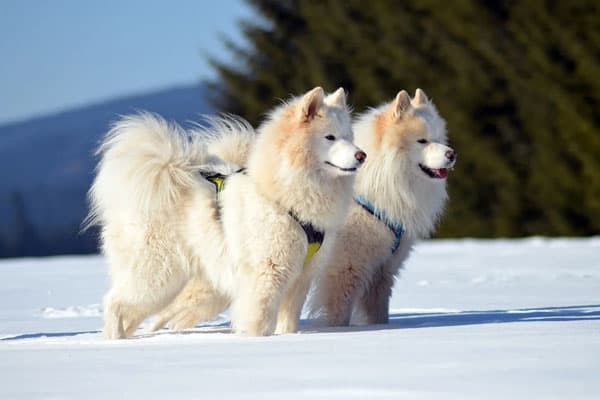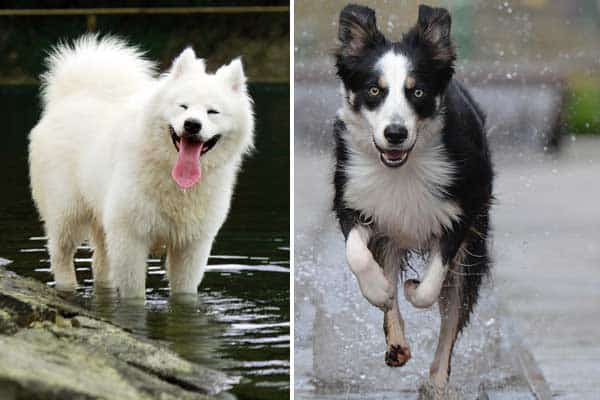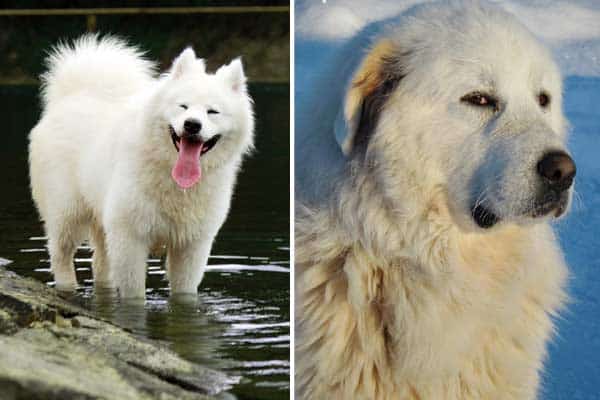Are Samoyeds Aggressive? Separating Fact from Fiction

Step into a world of giant, fluffy, white teddy bears known as Samoyed Dogs. With their ever-smiling faces, it’s hard to imagine them as aggressive. But are Samoyeds aggressive?
This article unveils the traits of a well-bred, well-trained, and well-socialized adult Samoyed while also exploring the factors that may trigger aggressive behavior. Discover how to maintain their cheerful nature and address any aggression issues. Join us on this captivating journey into the world of Samoyed dogs.
Are Samoyeds Aggressive?
No, Samoyeds are not generally considered aggressive dogs. They are known for their friendly and gentle nature. Samoyeds are typically good-natured, affectionate, and sociable with both people and other animals. However, individual temperament can vary.
Proper socialization, training, and responsible ownership are essential for shaping a dog’s behavior. If considering a Samoyed, it’s advisable to spend time with the specific dog to assess its temperament.
Typical Samoyed Personality and Temperament
According to the Samoyed Dog Breed Club of America, the typical Samoyed dog personality is sociable, bright and active, and eager to be with their people.
Barking is Normal for Samoyed
Samoyed dogs are naturally “talkative” and are known to be barkers by nature. So here, while lots of barking can indicate aggression for some dog breeds, a lot of vocalizing is not necessarily a sign of aggression in Sammies. It can signify that your dog needs more training to learn when to bark.
Samoyed are Active and People-centric
The Samoyed dog breed is a very active dog that loves to be with their people and is usually as close to their favorite family members as possible.
They hate being left alone, which means separation anxiety, which is not the same as aggression. However, it can seem similar behaviorally and is more common in this dog breed.
A Samoyed dog that is left alone for long periods regularly is likely to develop aggressive or anxious behaviors because its personality doesn’t tolerate alone time well.
Samoyed are Herders and Guarders
The Samoyed dog comes from a long lineage of working dogs that has traditionally helped with herding and guarding livestock and serving as a watchdog for people.
So having your Sammie following you and your family around and nipping at your heels or nudging you is not necessarily a sign of aggressive behavior.
Here, it is essential to do your best to determine your dog’s motivation for behaving in specific ways before deciding you have an aggressive Sammie.
Warning Signs of Samoyed Dog Aggression
According to the Samoyed Club of America Education and Research Foundation, certain traits tend to show up when a Samoyed dog starts behaving aggressively. The following categories identify these traits.
Vocalizations
Barking, growling, whining, howling, snarling, and audible teeth snapping are all vocal signs that a Samoyed is aggressive.
Body Language
Physical signs and symptoms of Samoyed aggression can include curling of the lip (a “snarl” type expression), stiff movement, ears slicked back, tail not wagging, staring, and raised hair (this one can be tough to identify on the fluffy Samoyed).
Behavior
Biting or mouthing, snapping or nipping, digging, jumping, constant escape attempts, territorial guarding of food or belongings (or even “their” people), and aggressive movement towards or away from someone or something are all behavioral signs of a Samoyed that is feeling aggressive.
Samoyeds Need Early and Ongoing Socialization and Training
As the Samoyed Rescue Alliance charity explains, Samoyeds will likely develop problem behaviors if these dogs don’t get the positive, consistent, early, and ongoing training and socialization they need to be companion canines.
Samoyeds are working dogs to their core. Everything about these dogs – including their perpetually upturned mouths that make them look like they are constantly smiling – is designed with their work in mind.
As the American Kennel Club (AKC) explains, just like their amazingly thick double-layer coat is designed to protect against the cold, that smiling upturned mouth is designed to keep the drool from turning to icicles while they are out herding reindeer in sub-zero temperatures.
When you select a working dog breed to be your family pet, it is vital to understand that you are choosing an energetic dog that will drive you crazy if you don’t keep them busy all day.
In particular, Samoyeds have a nearly irresistible urge to roam, run, and chase. This is also part of their job description, herding reindeer and other livestock over long distances. A Sammie that didn’t want to run a lot wouldn’t be a perfect herding dog.
But in a domestic situation as a family pet, your Sammie will likely be unable to resist herding you, chasing the squirrels in the backyard, and trying to figure out how to escape the backyard if left outside alone.
It will be your job to socialize your Samoyed sufficiently so that your dog doesn’t accidentally harm a person or another animal by trying to “herd” them or chase them.
You will also have the challenge of training your Samoyed to obey basic commands this breed may not grasp the significance of.
A working dog bred through generations to run and run freely all day is not likely to have a solid genetic reference for commands like “sit” and “stay.”
This is why Samoyeds is not generally a recommended breed choice for a first-time dog owner. However, working with a professional K-9 trainer can help you if you have your heart set on a Sammie, and this will be your very first pet dog.
Why is My Samoyed so Aggressive
As the American Kennel Club (AKC) points out, most aggressive dogs start by becoming reactive.
As Middle the Samoyed highlights, this can be a particular problem with Samoyed dogs because they tend to develop a closer bond with the person who is most involved in their training and daily care.
So a Samoyed that has developed a very close bond with you may become reactive when another family pet or another person seems to want to pull you away from your dog.
Samoyeds can also become reactive towards other dogs when they reach sexual maturity or perceive the other dog is competing for the attention of “their” people.
All of this means the first step to working with a reactive or aggressive Samoyed is to identify what is causing the behavior in the first place. You need to see life from your dog’s point of view before you can take steps to dial down the aggression.
There are other common reasons why a dog might behave reactively or aggressively, and it is essential to consider these before labeling your Sammie as “aggressive.”
Sickness or Injury
For example, your Samoyed could be injured or sick. Like other animals, dogs often try to hide signs of illness, injury, or weakness because their ancient survival instincts tell them this is vital.
Prior Abuse or Trauma
Your Samoyed might also be legitimately scared because of previous trauma, neglect, or abuse. If your Sammie is only reactive or aggressive in certain situations or due to specific triggers, this may be why.
Legitimate Guarding or Protective Instincts
And your Sammie might be reacting to a perceived or real threat from another animal, person, or situation. As a guarding and protection herding dog, there are times when aggressive behavior may be protective behavior your dog feels, is warranted.
Working With An Aggressive Samoyed Dog
Because Samoyeds are considered a challenging breed to train even when there is no reactive or aggressive behavior, the best approach is to contact a K-9 training professional for help.
Samoyeds might not be large dogs but they can still be dangerous if reactive or aggressive behaviors are left unaddressed. The faster you address the problem behaviors, the faster your Samoyed will start adjusting well to daily life in a family and community.
Learn About Samoyed Problem Behaviors From a Samoyed Dog Owner
This short, focused, owner-made YouTube video gives a helpful big-picture perspective of the Samoyed personality. These dogs are bright, curious, active, and easily able to find ways to entertain themselves when bored.
This means that the Samoyed dog breed’s so-called “problem behaviors” arise from boredom. This also means that fixing the problem behaviors typically boils down to finding your dog something engaging to do.






Thx. Our Samoyed growls and snaps when retrieving something she she not have like a kitchen towel, paper, things that would be harmful to her it she eats it. Makes a fuss barking if not given attending when some comes in he house. She try’s to jump on people for affection. Loves people. I guess when she gets something she takes personal possession.